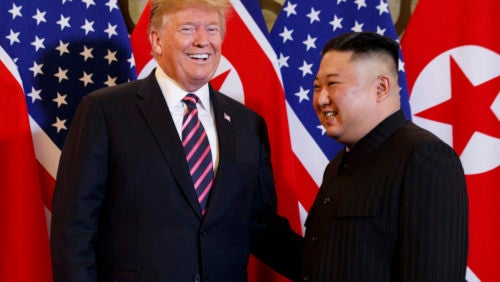As Leaders Prepare to Meet in Hanoi, Experts at Georgetown Law Discuss “The Continuing Threat of Nuclear Weapons”
February 27, 2019

President Donald Trump meets North Korean leader Kim Jong Un, Wednesday, Feb. 27, 2019, in Hanoi. (AP Photo/ Evan Vucci)
Just before U.S. President Donald Trump arrived in Vietnam for a summit with North Korean leader Kim Jung Un — the second such summit since June 2018 — the experts came to Georgetown Law for a conference on “The Continuing Threat of Nuclear Weapons.”
With denuclearization and sanctions on the table for the two leaders in Hanoi, back home in Washington, Georgetown Law Professor James V. Feinerman and others explored how to counter the North Korean nuclear threat.
“A huge obstacle facing U.S. policy towards North Korea is that North Korea’s path towards nuclear status was by some estimates illegal, or at least exploited loopholes…” said Scott Snyder of the Council on Foreign Relations, noting that North Korea joined the Nuclear Non-Proliferation Treaty as a non-nuclear state but subsequently became a nuclear state. “How does the United States deal with that situation — where we know that they have the capability, but to recognize the capability would possibly validate a pathway to nuclear status?…How do we manage the issue of keeping them in the penalty box, despite their assertions that they want to become a responsible nuclear state?”
The challenge for both countries in Hanoi, he said, is to build on the agreement that came out of Singapore last June, moving forward on a new U.S.-North Korea relationship and working towards complete denuclearization. “There’s still a pretty wide range of possible outcomes…[the leaders] can probably find a way to craft a…deal involving some steps on international inspection of some facilities in return for some kind of accommodation of steps on peace, and possible specific sanctions lifting.”
Americans have consistently supported diplomacy to address the North Korea nuclear challenge, Snyder said. “There is support for economic sanctions and there is clearly not support for military options. So I think President Trump hit a ‘sweet spot’ by focusing on diplomacy that is consistent with public opinion.”
Sue Mi Terry of the Center for Strategic and International Studies predicted “an interim deal that could [be] a basemark for future negotiations”— perhaps a continued halt in nuclear and missile testing, a cap on nuclear stockpiles, and international inspectors at certain sites. In return, the United States could agree to a continued moratorium on exercises for South Korea, some easing of sanctions, and a peace declaration. North Korea likely will not agree to a full denuclearization of its nuclear missile program, and there is no support for the United States to withdraw troops from South Korea.
If there is a peace declaration, Terry said, the U.S. and North Korea should not walk out with different interpretations of what it means. Still, “I think North Korea…wants a deal,” she said.
Where We Are
The February 25 conference was co-sponsored by The Journal of National Security Law & Policy, The Georgetown Center for Asian Law and The Georgetown Center on National Security and the Law. Executive Director Nadia Asancheyev (L’06) and Journal Symposium co-editors Isabell Fathy (L’19) and Paul Moe (L’19) organized the event.
The day began with remarks by Vermont Law Professor Steve Dycus; then, Georgetown Law Professor David Koplow led a panel on the recent U.N. Treaty on the Prohibition of Nuclear Weapons. A panel led by Ohio State Law Professor Dakota Rudesill (a former Georgetown Law visiting professor), examined U.S./Russia nuclear relations.
Joseph Cirincione, president of the Ploughshares Fund, delivered a keynote address on “The Failure of U.S. Nuclear Policies.” The United States is the most powerful nation on earth, he noted, and our policy matters. Yet the United States has made some very poor choices over the past few decades when it comes to nuclear policy.
“Nuclear dangers are intimately connected to our policies…” he said, asserting that President Obama “kicked the nuclear can down the road.”
“There was no better time to fix the problems; the problems got worse,” Cirincione said. “That is what happened with North Korea… If you just keep kicking this nuclear can, one of these days it is going to explode.”
Worsening problems include Iran; the command and control of nuclear weapons; the new nuclear arms race; and the shredding of the nuclear safety net.
“Why on earth would we give one person the power to destroy all of human civilization in an hour…?” he said. “Who would choose to do that? And yet, that’s where we are.”
The United States will want to take the opportunity, while we are the dominant power, he warned, to set the rules of the road that others will follow. Yet the U.S. continues to expect that other countries will submit. “[Some think,] these treaties are obstacles to us defining the rules of the road, so let’s get rid of them? This is an extremely short sighted view…,” Cirincione said. “This idea that we are going to be [the dominant power] forever — we’re not.”